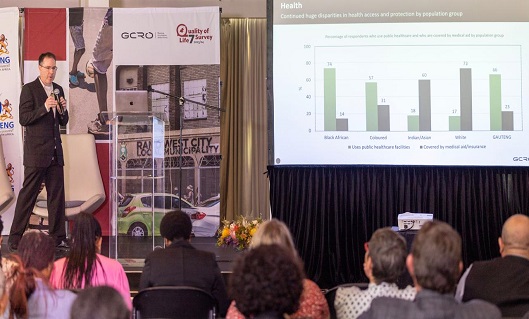
Lerato Mailoane
A new Quality of Life (QoL) Survey by the Gauteng City-Region Observatory (GCRO) has revealed a troubling decline in living conditions across Gauteng, with many residents expressing deep dissatisfaction.
Outlining the findings, GCRO Executive Director Rashid Seedat said the survey’s findings argue that households are experiencing the effects of the poly-crisis, a term coined to refer to complex and interconnected crises and challenges in many different domains of life, particularly following the COVID-19 pandemic.
The impacts of the polycrisis are evident in findings on poverty, unreliable services, crime and violence, poor health, transport difficulties and extreme environmental events.
The survey further shows a growing disillusionment with all levels of government, while unemployment remains alarmingly high.
The survey, which covered the period from August 2023 to mid-April 2024, gathered responses from 13,795 randomly selected participants across Gauteng’s 529 wards. Premier Panyaza Lesufi attended the event in Sandton.
In its seventh iteration since 2009, the QoL survey aims to offer a comprehensive snapshot of the province’s socio-economic landscape, service delivery satisfaction, and public sentiment. The data help inform government policy decisions and provide a snapshot of life for Gauteng residents for academics, businesses, and civil society groups.
GCRO Director of Research Strategy Graeme Gotz noted that 48% of respondents reported a rise in crime, with over 80% feeling unsafe walking at night. More than 60% expressed dissatisfaction with government efforts to protect residents.
“A different kind of crisis manifesting in households is the breakdown in the supply of state-run or state-owned services. This impacts households indiscriminately; even those households that can afford to buy electricity or pay for electricity, water and refuse removal might not be able to benefit from them due to service interruptions,” Gotz explained.
Gotz said it’s worrying that 85% of respondents find it challenging to find employment but is encouraged by the fact that the food poverty line has not increased and has gone down. However, overall incomes haven’t increased with inflation, worsening food security.
The survey revealed a sharp rise in water interruptions, from 30% of respondents in 2017/18 to 46% in 2023/24. An alarming 19% of households reported damage from burst water or sewage pipes. Refuse removal services have also deteriorated, with access in Emfuleni falling to just 11%.
Responding to the findings, Premier Lesufi acknowledged the severity of the situation, particularly the link between rising crime and failing service delivery.
The construction mafias delaying government projects only worsened the situation, he said.
Lesufi also emphasised the need for urgent intervention at the local government level, noting, “Local government is the only government closest to the people. If it’s dysfunctional, it affects everyone.”
From Wednesday, Lesufi said Gauteng convene the Local Government Turnaround Summit.
“If we can’t intervene at that level, it’s going to be very difficult because we need a massive intervention at a local level. Let local government do what local governments must do.”
At the same time, Lesufi touched on the level of crime in the province, citing it as utterly unacceptable, and warned that unaddressed crime in Gauteng would have far-reaching consequences nationwide.
SOURCED FROM THE GPG WEBSITE.

